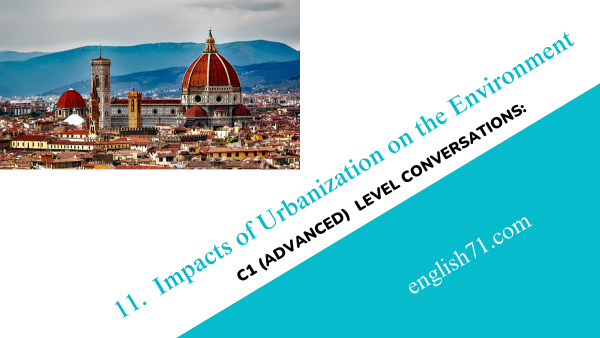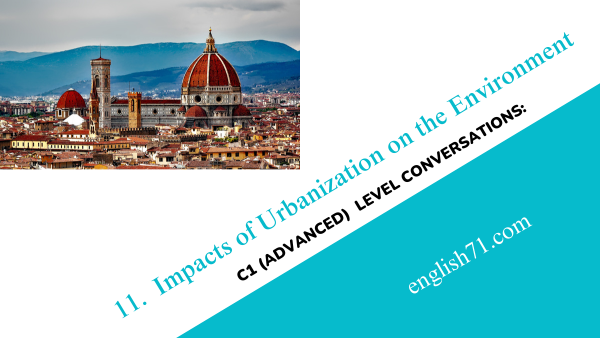C1 (Advanced) level Conversations: (11) Impacts of Urbanization on the Environment

Thomas: Hi Michael! Have you been reflecting on the impacts of urbanization on the environment lately?
Michael: Hey Thomas! Absolutely, it’s a topic that’s been on my mind. Urbanization brings both opportunities and challenges, especially concerning environmental sustainability. Have you noticed any significant trends or concerns?
Thomas: Definitely. One major concern is the loss of natural habitats and biodiversity due to urban expansion. As cities grow, they encroach upon ecosystems, leading to habitat fragmentation and loss of biodiversity.
Michael: That’s a critical issue indeed. I’ve also been thinking about the strain urbanization puts on resources like water and energy. The demand for these resources escalates with population growth, leading to issues like water scarcity and increased greenhouse gas emissions.
Thomas: You’re absolutely right. Water scarcity is a pressing issue in many urban areas, exacerbated by factors like over-extraction, pollution, and inefficient water management practices. Similarly, the energy demands of cities contribute significantly to carbon emissions and climate change.
Michael: It’s concerning how urbanization amplifies these environmental challenges. However, I’ve heard about initiatives promoting sustainable urban development. Have you come across any innovative solutions in this regard?
Thomas: Yes, there are various approaches being explored to foster more sustainable cities. From green infrastructure projects like urban parks and green roofs to initiatives promoting public transportation and renewable energy adoption, there’s a growing emphasis on building resilient and eco-friendly urban environments.
Michael: That’s promising to hear. It seems that smart urban planning and policy interventions can mitigate some of the negative impacts of urbanization on the environment. How do you think cities can balance the need for development with environmental conservation?
Thomas: It’s a delicate balance, Michael. Sustainable urban development requires integrated planning that considers environmental, social, and economic factors. Strategies like compact city design, mixed land use zoning, and green building standards can help minimize environmental impact while promoting economic growth and social equity.
Michael: Absolutely, Thomas. By prioritizing sustainability in urban planning and decision-making, cities can create healthier and more livable environments for residents while safeguarding natural resources. It’s about finding synergies between development and conservation efforts.
Thomas: Precisely. It’s encouraging to see cities around the world embracing sustainability principles and adopting innovative solutions to address the environmental challenges associated with urbanization. As individuals, we can also play a role by advocating for sustainable policies and adopting eco-friendly practices in our daily lives.
Michael: I couldn’t agree more, Thomas. Every action, whether big or small, contributes to building more sustainable and resilient cities. Thanks for the enlightening discussion!
Thomas: Likewise, Michael! It’s been great exploring this topic with you. Let’s continue to stay informed and engaged in promoting environmental sustainability in our urban communities.

Summary:
Thomas and Michael engage in a comprehensive discussion about the impacts of urbanization on the environment. They address concerns such as habitat loss, resource scarcity, and increased carbon emissions associated with rapid urban growth. Despite the challenges, they highlight the potential for sustainable urban development through initiatives like green infrastructure and renewable energy adoption. The conversation emphasizes the importance of integrated planning and individual action in creating resilient and eco-friendly cities.

